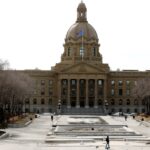The path toward an Alberta-only pension plan appears to have hit a significant roadblock. Premier Danielle Smith recently acknowledged there isn’t much appetite among Albertans for breaking away from the Canada Pension Plan (CPP), effectively pressing pause on one of her government’s most discussed autonomy initiatives.
During a recent radio phone-in show, Smith revealed what many community observers have been sensing for months. “I don’t see an appetite for the pension plan right now,” she said, noting that her government would instead focus on the Alberta Police Service and other sovereignty initiatives that might generate stronger public support.
This shift represents a notable policy adjustment for Smith’s United Conservative Party government, which had previously championed pension independence as part of its broader “Alberta First” approach to federal-provincial relations.
The announcement didn’t surprise Janet Brown, one of Edmonton’s most respected pollsters. “The public reaction to an Alberta pension plan has been consistently skeptical,” she told me during a conversation about shifting provincial priorities. Brown’s polling has shown that fewer than 30% of Albertans strongly support leaving the CPP, with many expressing concerns about financial security and implementation challenges.
At Cafe Bicyclette last week, I overheard several retirees discussing the news with visible relief. “My retirement isn’t a political bargaining chip,” said Michael Thornton, a 67-year-old former teacher. “The Canada Pension Plan has served me well. Why mess with something that works?”
The provincial government’s own engagement survey revealed similar sentiments, with a substantial majority of respondents preferring to remain within the federal program rather than venture into uncharted territory with an Alberta-only plan.
Financial experts have pointed to several challenges that likely contributed to the premier’s decision. The transition costs alone could reach into the billions, creating significant fiscal uncertainty during an already volatile economic period.
“Establishing a provincial pension system isn’t like flipping a switch,” explained Olivia Martinez, financial analyst with Edmonton Financial Advisors. “There are complex administrative structures, investment strategies, and risk management protocols that would need development from the ground up.”
Critics of the Alberta pension proposal, including several local labor organizations, have celebrated Smith’s apparent change of direction. The Alberta Federation of Labour had been particularly vocal about potential risks to retirement security.
Meanwhile, some supporters of provincial autonomy expressed disappointment but acknowledged the political reality. Jason Goodstriker, co-chair of the Fair Deal Panel that originally proposed considering a provincial pension plan, noted: “Sometimes you need to read the room. If Albertans aren’t convinced this is the right move right now, that’s something government needs to respect.”
The pension plan pause doesn’t mean Smith has abandoned her broader sovereignty agenda. Her government continues to pursue other initiatives aimed at increasing provincial autonomy, including plans for an Alberta Police Service and a provincial revenue agency.
What’s particularly striking about this development is how it reflects the complex relationship Albertans have with federal institutions. While many support greater provincial authority in principle, specific proposals that might affect personal financial security often face more scrutiny.
As I walked through Churchill Square yesterday afternoon, I asked several passersby about their thoughts on the pension plan announcement. The responses revealed nuanced perspectives that don’t always align with partisan positions.
“I usually support Smith’s pushback against Ottawa,” said Linda Mackenzie, a small business owner. “But my pension? That’s different. I need to know my retirement is secure, and the CPP has a solid track record.”
Smith’s willingness to adapt her approach demonstrates political pragmatism, according to political scientist Roger Epp. “Governments that listen and respond to clear public feedback tend to strengthen their position, even when changing course,” he suggested during our conversation about Alberta’s evolving sovereignty movement.
For now, Albertans can expect their CPP contributions and benefits to continue unchanged, while the province redirects its autonomy efforts toward initiatives with stronger public support. Whether this represents a temporary pause or a permanent abandonment







